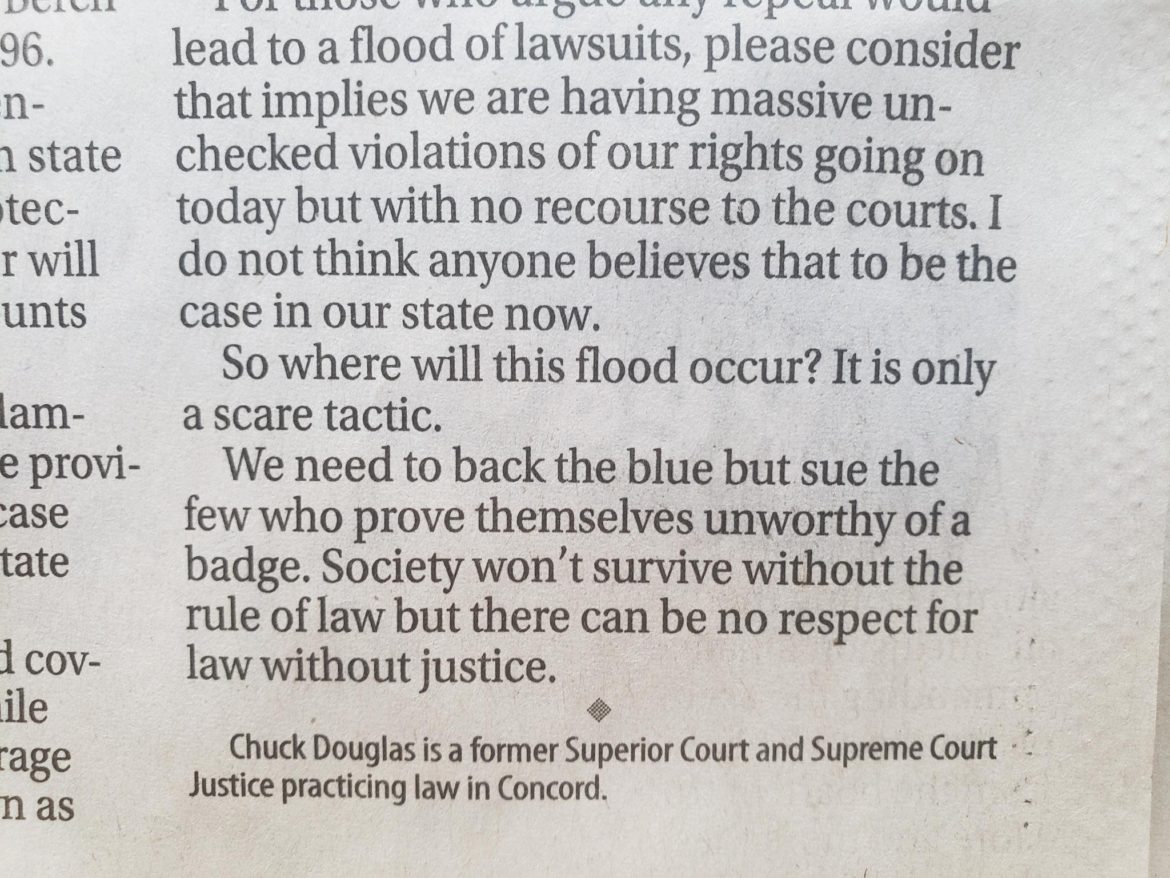Carla Gericke
One of my favorite interviews ever! Michelle and I discuss the Free State Project, which offers the best solution against statism, why NH is awesome and how we can keep it that way, COVID-madness, self-ownership, transformations, my Origin Story, and, unbelievably, more!
Learn how to make a basic egg frittata that conforms to paleo/keto diets. This one is a ham, mushroom, and cherry tomato frittata, but the idea is once you master the basics, you can make a delicious, nutritious version whenever with whatever is in the fridge. Watch to find out what this week’s secret ingredient is! Real food made with liberty and love!
#keto #freedomnomnom #paleo #AncestralLiving #LiveFreeAndThrive

Ingredients
- 6 Eggs
- Butter
- Meat (today's was ham but could be bacon or whatever you have around)
- Cheese (today's was cheddar but could be goat's or whatever you have around)
- Vegetable (today's was mushroom but could be broccoli or... you get the picture! ;P)
- Mustard (1 tbs)
- Cream (dash)
Instructions
Preheat oven to 375F. Melt butter in your pan (Heat 3) and brown the ham, add the mushrooms, stirring occasionally. In a separate bowl, beat 6 eggs with fork, add seasoning (salt & pepper), a dash of cream, and a tbs of mustard. Pour the well beaten eggs over the mix, plop in the cherry tomatoes. When the top is a little more set (2-3 minutes), add a handful or two of grated cheddar on top. In the oven in the middle rack for 10-12 minutes until middle no longer jiggles. Remove and enjoy!
Join Carla Gericke in her rustic Ancestral kitchen to learn how to make a basic meat stew that conforms to paleo/keto diets made with celery, red onions, carrots, shallots, and leeks. After 2 hours in the cast iron pot in the 325F oven, she added sweet potatoes, and cooked for another hour. #keto #freedomnomnom #paleo #AncestralLiving #LiveFreeAndThrive
XTRAS and CORRECTIONS
Tee shirt says: “Women in the Free State: New Hampshire 2021.”
The event I referenced is PorcFest, now in its 18th year. Learn more…
Think I accidentally said oven was on 375F, but it’s low and slow on 325F; and I called my Big Sister, Lizette, my “little sister,” oops. 
I will comb my hair next time, LOL.
Thanks for watching! Please hit the SUBSCRIBE button!


Basic Paleo Meat Stew
PrintIngredients
- Osso Bucco cut beef (2 large)
- Celery (4-5 stalks)
- Carrot (1 large)
- Red Onion (2 small)
- Garlic (1 tbs)
- Shallots (1 medium)
- Leek (1 large)
- Sweet potato (1 large cut into quarters)
- Beef stock
Instructions
Bring meat to room temperature. Season liberally with salt, pepper, and garlic powder. Heat fat over medium-high heat (4). I used saved beef fat and some lamb lard. Brown meat on both sides, set aside. In same pot, scrape off browned bits and add vegetables, cooking for 5-7 minutes, stirring occasionally. Add meat back into pot, add beef stock, and some boiling water if necessary to get liquid close to covering the meat. Bring to simmer and then remove, put on lid firmly, and place in oven at 325F for 2 hours. After 2 hours, add the quartered sweet potatoes and cook for another hour. I added 2 bay leaves for the last hour as well. Serve in bowls. For #paleo, #keto eaters, this dish can be served on caulimash, sautéd kale, or other non-carb substitutes like zoodles. I just ate it as is. #Freedomnomnom!
There’s an Avett Brothers song, “Head Full Of Doubt / Road Full Of Promise” that always inspires me:
“When nothing is owed or deserved or expected
And your life doesn’t change by the man that’s elected
If you’re loved by someone, you’re never rejected
Decide what to be and go be it.”
Because I’m good at a lot of things, for the longest time, my struggle was “deciding what to be.” I’m a trained lawyer. I’m an author. I do a lot of political activism. I cook. Garden. I lead and mentor. I’ve been told I’m not the world’s worst wife. ![]()
In order to be yourself, you have to know yourself.
When I was graduating from high school at sixteen, I was asked during an aptitude test what I wanted to be “when I grow up.” My answer: A writer and a fashionista.
In South Africa in the mid-Eighties, this wasn’t an “acceptable” career choice, so, bowing to societal and family pressure, I ended up practicing law on two continents, including at Logitech and Apple Computer.
Now, more than thirty years later, it’s clear to me that my instincts back then were right. I /still/ want to be a writer and a fashionista. (Really, I just love writing the word “fashionista.” LOL)
We know ourselves. Decide what to be and go be it.
Not sure where to start? Try journaling. Make a promise to yourself to jot down at least a few things daily. “Daily” is important, because it creates a routine, and routines, whether we like it or not, become habits and good habits make life easier. Good habits make it easier to DECIDE WHAT TO BE AND GO BE IT.
In my journal, I make notes about my mood, things I’m grateful about or maybe pissed off about, successes, failures, whether I meditated, did yoga or other exercise, etc. But mostly, with the habit of daily journaling, I was able to “hear” the voices in my head, especially the negative ones who tell you you can’t be who YOU want TO BE. You know the one. Those jerks who usually speak to you in the second person. Who is this person in your head who doesn’t think they’re even part of you? That mofo jerk who holds you back from knowing, deciding, and being your best YOU? Well, I discovered and smothered mine, and YOU can too! (Read more about that here.)
Deciding what to BE is HARD, and not static, so recently I decided a hack I would try was simply to focus on the “GO BE IT” part. Through my journaling, I’ve analyzed where I spend my time, and what of those activities actually make me happy. Not the “hafta dos” or “kinda must dos” but the, I LOVE TO DO THIS AND WISH I CAN TELL EVERYONE IN THE WORLD.
What are you DOING with your TIME?
Once I realized how much of my time I spent drinking or thinking about drinking, and how little I spent on ACTUALLY writing and finishing my first book, The Ecstatic Pessimist now available on Amazon, I knew something needed to change.
So I changed.
I quit drinking in 2017 after reading This Naked Mind, and I have never, ever regretted this DECISION. Know why? Because it was MY choice. MY decision. I owned it and I made myself proud.
These days, I never think about drinking, except sometimes in a “Man, I’m so glad I quit” way because I am too busy living a complete and fulfilling life. I am too busy deciding what to be and then being it.
I want to help YOU on YOUR journey. Tell me something you’re working on, something you’d like to become and be! Change is possible, you just have to CHOOSE to change! If I can, so can YOU!
Catch me being here:
The Art of Independence: www.CarlaGericke.com
On YouTube
PS: I know the 2020 photo does not look chill, but it was literally the moment I uploaded my manuscript and I was tres excite.
Welcome to Freedomnomnom!
I’ve been wanting to start a cooking show for yonks, and, in keeping with my Carpe Diem life philosophy, decided, there’s no time like the present! So this past Sunday, I set up the camera (the wrong way), forgot to put on makeup (the wrong thing), didn’t have a clear plan (wrong again) and then just WENT. FOR. IT. And know what? It came out A-OK, all things considered, and, as always, a learning experience that allows for improvement.
On the menu 04/02/21: Medium-rare grass fed steak, cinnamon-ginger sweet potato slices, and a foraged fiddlehead and garlic mustard pesto with toasted pine- and walnuts.

Fiddlehead and Garlic Mustard Pesto
PrintIngredients
- Fiddleheads (seasonally available in early Spring, must be processed as described in this video otherwise can be poisonous)
- Garlic Mustard
- Pine Nuts
- Walnuts
- Olive Oil
- (I was out of parmesan, oh well, still tasted great, so you can or can't add depending on what's in your kitchen)
Instructions
Wash the locally foraged greens. Blanch and shock the fiddleheads. <---DO NOT SKIP THIS STEP! Whirl in the food processor with toasted walnuts and pine nuts, slowly drizzling in 1-2 teaspoons of olive oil. I added extra fried garlic. Season liberally with salt, black pepper and garlic powder. Squeeze some lemon on top. Stir and keep at room temperature until the rest of the meal comes together.
What if we lay the blame for poverty at the government’s feet where it belongs? Comrade Volinksy complains about a lack of minimum wage, but what he really needs is a lesson in sound money. America is paying today’s bills with credit cards. How long can it last? And… tulips!
The photo on the left came up in my Facebook memories today–OOOF!–and serves as a reminder of the positive changes I’ve made over the past four years.
The #1 change? Making MYSELF and MY HEALTH a priority.
How?
By switching to Ancestral living, focusing on whole #keto and #paleo foods. <— Catch my Sunday #freedomnomnom posts!
By quitting alcohol, which had become an addiction and crutch.
By processing underlying anxiety stemming from an unmoored childhood through journaling and behavioral modification therapy.
By making exercise a daily habit and restarting my yoga practice.
By meditating and being mindful and aware in my interactions with others, including deepening my relationship with my husband and friends.
By CHOOSING TO. <— This is THE KEY to fulfillment and joy!
DECIDE to prioritize yourself so that you can heal, mend, fix, restart, grow, change and IMPROVE! We get one chance… Get living! Learn more about my journey HERE. Buy my book, The Ecstatic Pessimist HERE.






